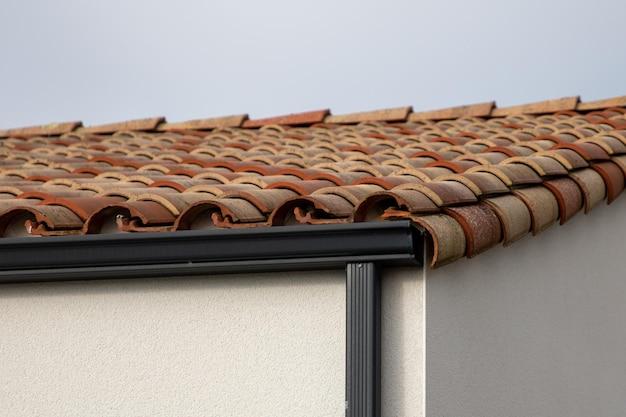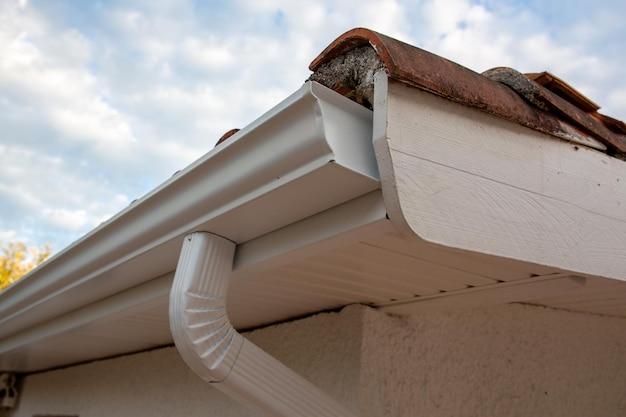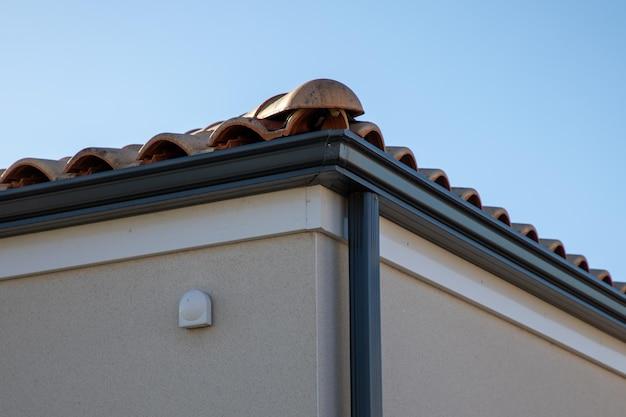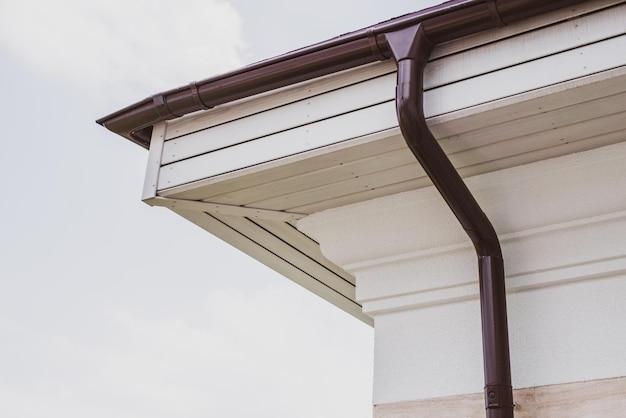If you’re wondering whether you need gutters on your garage, you’re not alone. The importance of gutters is often associated with residential houses, but what about detached garages? Is it necessary to have gutters installed? In this blog post, we’ll delve into the world of garage gutters and address common questions like “Are gutters always necessary?” and “What is the disadvantage of not having gutters?”. We’ll also explore how to install gutters and whether detached garages and those with a slab foundation require them. So, let’s get started and find out if gutters are a must-have for your garage!
Do I Need Gutters on My Garage
The Importance of Gutters on Your Garage
When it comes to ensuring the longevity and functionality of your garage, gutters might not be the first thing that comes to mind. However, installing gutters on your garage can make a significant difference in protecting your structure and belongings from potential water damage. Let’s dive into the reasons why having gutters on your garage is essential.
Prevent Water Damage
Without gutters, rainwater can easily accumulate around your garage’s foundation, leading to potential water damage. This can weaken the foundation over time, causing cracks and structural issues. By diverting rainwater away from your garage, gutters play a crucial role in preventing water damage and protecting your investment.
Preserve the Aesthetics
Gutters not only serve a functional purpose but also contribute to the overall appearance of your garage. Without gutters, rainwater can create unsightly streaks down the sides of your garage, leaving behind dirt marks and damage to the paint or siding. Installing gutters ensures that rainwater is directed away from the building, preserving its aesthetics for years to come.
Avoid Erosion and Landscaping Issues
When rainwater flows off your garage roof without gutters, it can create water runoff that can erode the soil around the foundation. This can lead to various problems, including uneven ground, standing water, and damage to your landscaping. By channeling the rainwater away from your garage, gutters help prevent erosion and maintain the integrity of your landscape.
Protect the Garage Door and Windows
Gutters play a crucial role in protecting not only the structure of your garage but also its components. Rainwater can seep into the garage through the door and windows, causing moisture-related damage over time. With gutters in place, you can minimize the risk of water infiltration and keep your garage and its contents safe and dry.
In conclusion, installing gutters on your garage is vital to protect your investment, preserve its aesthetics, and prevent water damage. By diverting rainwater away from the foundation, gutters help maintain the structural integrity of the garage, prevent erosion, and protect its components. Don’t underestimate the importance of gutters in safeguarding your garage and everything inside it—installing gutters is a wise decision that will pay off in the long run.
How to Install Gutters
Want to protect your garage from water damage? Installing gutters is a smart move! Here’s a step-by-step guide on how to install gutters for your garage:
1. Gather Your Materials
Before diving into the gutter installation process, make sure you have all the necessary materials. You’ll need gutter sections, downspouts, gutter hangers or brackets, screws, a drill, a ladder, a miter saw, and a measuring tape. With these tools in hand, you’ll be ready to get started.
2. Measure and Plan
Measure the length of your garage and determine the optimal placement for your gutters. It’s essential to plan where the downspouts will be positioned to ensure proper water drainage. Keep in mind that water should flow away from your garage’s foundation.
3. Install the Gutters
Attach the gutter hangers or brackets to the fascia board of your garage. Ensure they are evenly spaced and securely fastened. Then, attach the gutter sections to the hangers, making sure they are sloping slightly toward the downspouts for efficient water flow.
4. Cut and Connect
Using a miter saw, cut the gutter sections according to your measurements. Connect the pieces together, sealing the joints with silicone caulk to prevent leaks. Repeat this process until you’ve covered the entire length of the garage with seamless gutters.
5. Install the Downspouts
Position the downspouts at the appropriate locations and fasten them to your garage. Make sure the downspout extensions direct water away from your foundation to avoid any potential water damage issues.
6. Test and Maintain
After completing the installation, give your gutter system a test run. Use a hose to simulate rainfall and ensure that water flows smoothly through the gutters and downspouts. Regularly clean and maintain your gutters to prevent any clogs or blockages.
By following these simple steps, you can effectively install gutters for your garage and protect it from water damage. So, go ahead and get started – your garage will thank you later!
Is it OK to not have gutters
When it comes to garage construction, the topic of whether or not to install gutters often raises some eyebrows. Some may argue that gutters are just an unnecessary accessory for garages, while others swear by their importance. So, is it really okay to not have gutters on your garage? Let’s dive deeper and explore the pros and cons.
The Case for Gutters
-
Protecting the Foundation
Gutters play a crucial role in diverting rainwater away from your garage’s foundation. Without them, water can seep into the ground and potentially cause foundation damage over time. So, if you want to avoid expensive repairs down the road, gutters can provide a layer of protection. -
Preserving the Siding
Gutters also help to protect the siding of your garage. By capturing rainwater, they prevent it from splashing onto the walls and causing water damage or mold growth. So if you care about maintaining the integrity and appearance of your garage, gutters might be a wise investment.
The Case Against Gutters
-
Cost and Maintenance
Installing gutters can come with a price tag, and if you’re on a tight budget, this may be a valid concern. Additionally, gutters require regular maintenance to keep them clean and free from debris. If you’re not up for the task or unwilling to shell out extra cash for maintenance, going gutter-less could be an option. -
Location Matters
Consider the climate and topography of your area. If you live in a dry region with minimal rainfall, gutters may not be as crucial. Similarly, if your garage is situated on sloping terrain where water naturally drains away, you might get away without gutters. However, it’s important to evaluate your specific circumstances before making a decision. -
Personal Preference
Ultimately, the choice to have gutters on your garage boils down to personal preference. Some people prioritize functionality and protection, while others may focus more on aesthetics. Assessing your priorities and weighing the pros and cons is key to making the right decision for your garage.
Don’t Forget the Rain Barrel Option!
If you still find yourself torn between having or not having gutters on your garage, there’s one compromise that might catch your interest: rain barrels. These eco-friendly devices can collect rainwater from your garage’s roof, providing you with a potential water source for gardening or other purposes. So, if you’re looking for a middle ground, consider installing gutters solely for the purpose of collecting rainwater with the help of a rain barrel.
In conclusion, whether or not to have gutters on your garage is not a one-size-fits-all decision. Consider the benefits they offer in terms of foundation and siding protection, along with the costs and maintenance involved. Factor in your location and personal preferences, and remember that compromise can also be an option. The choice is ultimately yours, so weigh your options wisely and make an informed decision for your garage.
Are Gutters Always Necessary
Introduction
Gutters are an essential component of any well-maintained home, but what about garages? Are gutters always necessary for garages? In this section, we’ll explore the importance of gutters on garages and whether or not they are a must-have feature.
Protecting Your Garage
Gutters serve a crucial purpose in maintaining the integrity of your garage. Without them, rainwater can run off the roof and pool around the foundation, leading to potential water damage. This water accumulation can also cause erosion of the soil and create an unstable foundation for your garage. So, while it may seem like an added expense, gutters safeguard your garage from moisture-related issues.
Preventing Basement Flooding
Believe it or not, gutters on your garage can also help prevent basement flooding. When rainwater is channeled away from your garage’s foundation, it reduces the chances of excess water seeping into your basement. The last thing you want after a heavy rainstorm is a flooded basement, so investing in gutters for your garage can save you from potential headaches and costly repairs.
Preserving the Exterior
Having gutters installed on your garage not only protects the foundation and basement but also preserves the exterior of the building. Rainwater running directly off the roof can create unsightly streaks and stains on the garage walls. Over time, this can lead to discoloration and deterioration of the surface. By diverting water away from the walls, gutters play a significant role in maintaining the aesthetics of your garage.
Aesthetics and Curb Appeal
Speaking of aesthetics, gutters can actually enhance the overall look of your garage. With a variety of materials and styles available, you can choose gutters that complement the architectural design of your garage. This small addition can elevate the curb appeal of your property, giving your garage a polished and complete appearance.
In conclusion, while it may be tempting to skip gutters on your garage, they are indeed necessary for protecting your investment. Gutters safeguard the foundation, prevent basement flooding, preserve the exterior, and even enhance the overall aesthetics of your garage. So, when considering whether or not to install gutters on your garage, don’t overlook the long-term benefits they provide.
Do Detached Garages Need Gutters
Gutters are an important feature for keeping rainwater away from your home, but do detached garages really need them? Let’s take a closer look at whether or not you should install gutters on your detached garage.
The Purpose of Gutters
First, let’s understand the purpose of gutters. Gutters are designed to collect rainwater that falls on the roof and direct it away from the foundation of your building. They help prevent water damage, protect the exterior walls, and prevent erosion around the structure.
Protecting Your Garage
Detached garages often serve as a storage space for vehicles, tools, and other valuable items. Installing gutters can help protect your garage and its contents from water damage caused by heavy rain or melting snow. Gutters channel the water away from the walls, preventing it from seeping inside and causing mold or rot.
Erosion Prevention
If your detached garage is located on an incline, it’s even more important to consider installing gutters. When rainwater flows off the roof without gutters, it can cause soil erosion around the building’s foundation. Over time, this can weaken the foundation, leading to structural issues and costly repairs.
Maintenance and Cleaning
While gutters offer many benefits, it’s important to note that they also require regular maintenance and cleaning. Leaves, debris, and other particles can clog the gutters, preventing them from effectively draining water. Fail to clean your gutters regularly, and you might end up with overflowing gutters and potential water damage problems.
Cost Considerations
When deciding whether to install gutters on your detached garage, cost is an important factor to consider. The cost of gutters can vary depending on the size of your garage, the materials used, and the complexity of the installation. However, compared to potential water damage and foundation issues, the cost of installing gutters is usually a worthwhile investment.
In conclusion, while it’s not absolutely necessary to install gutters on your detached garage, they provide several benefits for protecting your garage and its contents. Gutters help prevent water damage, protect the building’s foundation, and reduce the risk of erosion. Although gutters require regular maintenance, the added protection they offer is well worth the cost. So, if you want to keep your detached garage dry and in good condition, it’s a wise choice to consider installing gutters.
Installing Gutters on Detached Garage
Why Gutters Are Essential for Your Detached Garage
When it comes to protecting your detached garage, installing gutters is more important than you might think. While it may seem like an optional add-on, gutters serve a crucial purpose in preventing water damage and ensuring the longevity of your garage.
Avoiding Soil Erosion and Foundation Issues
One of the primary reasons for installing gutters on your detached garage is to prevent soil erosion. When rainwater pours off the roof and falls directly onto the ground, it can cause significant damage to the soil around your garage. Over time, this can lead to soil erosion and potentially compromise the foundation of your garage, leading to costly repairs.
Protecting Your Garage from Water Damage
Another important reason for having gutters on your detached garage is to protect it from water damage. Without gutters, rainwater can accumulate around the base of your garage, seeping into the foundation, and causing structural damage. By installing gutters, you can redirect the water away from your garage and ensure that it remains dry and in optimal condition.
Preventing Potential Mold and Mildew Issues
Without proper gutter installation, rainwater can accumulate in stagnant areas around your detached garage. This stagnant water creates the perfect breeding grounds for mold and mildew, which can not only damage the exterior of your garage but also pose health risks to you and your family. By installing gutters, you can effectively redirect the rainwater away, minimizing the chances of mold and mildew growth.
Maintaining the Aesthetic Appeal of Your Garage
Aside from the practical benefits, gutters also contribute to the overall aesthetic appeal of your detached garage. With a variety of gutter styles and colors available, you can choose an option that complements your garage’s design and enhances its visual appeal. By investing in gutter installation, you can ensure that your garage not only functions optimally but looks great too.
Installing gutters on your detached garage is a smart decision that offers numerous benefits, including protecting it from water damage, preventing soil erosion and foundation issues, avoiding mold and mildew growth, and maintaining its aesthetic appeal. By taking this proactive step, you can extend the lifespan of your garage and save yourself from expensive repairs in the long run. Don’t neglect this important aspect of garage maintenance – it’s certainly worth it!
Do I Need Gutters with Slab Foundation
Introduction
When it comes to the question of whether you need gutters on your garage, considering the type of foundation is crucial. If your garage has a slab foundation, you might be wondering if gutters are necessary. Let’s dive into this topic and explore all the reasons why having gutters with a slab foundation is beneficial.
Ensuring Proper Drainage
With a slab foundation, it might seem like there’s no need for gutters since there aren’t any additional structures to protect. However, gutters play a vital role in ensuring proper drainage, even with a slab foundation. Without gutters, rainwater can pool around the foundation, which can eventually lead to issues such as erosion and even cracks. Therefore, having gutters on your garage can help prevent potential damage to your foundation.
Protecting the Garage Exterior
Gutters not only protect the foundation but also safeguard the exterior of your garage. When rainwater cascades down from the roof, it can splash against the walls and create unsightly stains. Over time, this constant contact with water can cause the paint to peel or even lead to mold growth. By installing gutters, you can divert rainwater away from the walls and keep your garage looking pristine.
Preventing Basement Flooding
Even if your garage doesn’t have a basement, neighboring structures might be less fortunate. The foundation of your garage is interconnected with the surrounding areas. Without gutters, rainwater can seep into the ground and potentially flood basements nearby. By having gutters on your garage, you can prevent such water overflow, contributing to the overall well-being of your neighborhood.
Avoiding Soil Erosion
One of the often overlooked concerns with a slab foundation is soil erosion. Without gutters, heavy rainfall can wash away the soil around your garage, creating uneven ground and potential foundation instability. By directing rainwater away from the foundation, gutters help maintain the integrity of the surrounding soil, ensuring the long-term stability of your garage.
Whether your garage has a slab foundation or not, having gutters is always a smart decision. Gutters provide essential protection against water damage, preventing issues like foundation problems, exterior deterioration, basement flooding, and soil erosion. So, if you’re contemplating whether to install gutters on your garage with a slab foundation, the answer is a resounding yes. Don’t let your garage get soaked – invest in gutters and ensure the long-lasting safety and beauty of your space.
What is the Disadvantage of Not Having Gutters
The Importance of Gutters for Your Garage
When it comes to garages, many homeowners tend to overlook the importance of gutters. After all, they may think, “It’s just a garage, why would it need gutters?” However, neglecting to install gutters on your garage can actually lead to a range of issues and disadvantages that you may not have considered. In this section, we will explore the downside of not having gutters on your garage.
Water Damage and Erosion
One of the main disadvantages of not having gutters on your garage is the potential for water damage and erosion. Without gutters to direct the flow of rainwater away from your garage, water can collect around its foundation. Over time, this can lead to water seepage into your garage, causing costly damage to the structure and its contents. Additionally, the constant exposure to water can accelerate erosion, leading to cracks in the walls or foundation of your garage.
Landscaping Issues
Without gutters, the rainwater falling from the roof of your garage will create a water cascade around the perimeter of the building. This can result in serious damage to your landscaping, causing soil erosion, damage to plants, and flooding in your yard. This is especially true if your garage is located close to flower beds, shrubs, or other green spaces. By installing gutters, you can protect your landscaping and keep it looking beautiful.
Foundation Problems
Another disadvantage of not having gutters on your garage is the potential for foundation problems. Rainwater that is not properly directed away from your garage can accumulate around the foundation and seep into the soil beneath it. This can cause the soil to become saturated and expand, leading to foundation shifting or even structural damage. By installing gutters, you can prevent water from pooling around the foundation and maintain the stability of your garage.
Pest Infestation
Standing water around your garage, which can be a result of not having gutters, creates the perfect breeding ground for pests such as mosquitoes and other insects. The stagnant water attracts these unwanted visitors, increasing the risk of infestation not only in your garage but also in your home. By installing gutters and keeping water away from your garage, you can minimize the chances of pests finding a cozy spot in your property.
Curb Appeal and Property Value
Lastly, not having gutters on your garage can have a negative impact on the overall curb appeal and property value. With water damage, landscaping problems, potential foundation issues, and pest infestations, your garage may appear less appealing to potential buyers or visitors. Installing gutters not only improves the functionality of your garage but also enhances its visual appeal and maintains or increases its value.
In conclusion, neglecting to install gutters on your garage can result in various disadvantages such as water damage, erosion, landscaping issues, foundation problems, pest infestations, and a decrease in curb appeal and property value. Taking the time and effort to install gutters can prevent these issues and provide long-term benefits for your garage. So, don’t underestimate the importance of gutters – they’re not just for your house!



